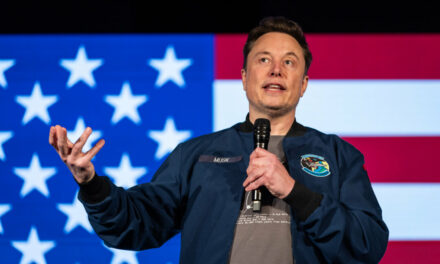We support our Publishers and Content Creators. You can view this story on their website by CLICKING HERE.
Experts said the two candidates are expected to take the same direction, but differences lie in their approaches, particularly on the war in Ukraine.
The next U.S. president is expected to navigate increasingly dangerous geopolitical waters as America’s two near peers, China and Russia, develop closer economic and military ties with one another and other rouge states.
So, how will the U.S. election affect the so-called China-Russia axis?
China
In terms of China policy, there was a great deal of continuity during the past two U.S. administrations.
President Joe Biden continued his predecessor President Donald Trump’s policies of imposing tariffs, controlling strategic goods and technologies, diversifying U.S. supply chains, and tackling the inflow of fentanyl from China.
Compared with Biden, a foreign relations veteran, Vice President and Democrat candidate Kamala Harris is an unknown entity. Her policy, if she is elected, will also depend on the circumstances and the people she appoints to her Cabinet, but the general assumption is that Harris will continue the current U.S. policy of competing with China while avoiding direct conflicts.
One known difference between Harris and Biden is that Harris has maintained the U.S. strategy of ambiguity on Taiwan while Biden said the United States would defend Taiwan if Beijing tried to annex the self-ruled island by force.
Lee Che-Chuan, research fellow at Taiwan’s Institute for National Defense, said there’s no consensus among scholars on which U.S. candidate the Chinese Communist Party (CCP) may prefer.
“Some believe Beijing may prefer Harris, who’s less experienced and could turn out to be more dovish towards China than Biden, but others believe China may be partial to Trump’s transactional approach and isolationist tendency, which allow room for negotiations and trade-offs,” Lee told The Epoch Times.
Su Tzu-yun, director of the think tank’s Division of Defense Strategy and Resources, told The Epoch Times that Trump’s unpredictability makes him harder for Beijing to handle.
However, despite their differences, neither Trump nor Harris is likely to be soft on China, they said.
Russia
The same goes for the Kremlin, according to Thomas Graham, distinguished fellow at the Council on Foreign Relations and senior director for Russian affairs in former President George W. Bush’s National Security Council, who said neither candidate is considered “ideal” in Moscow.
Kremlin officials believe that “the American political establishment is fundamentally anti-Russian, and that will continue for some time, and that is really the framework in which they need to think about American politics and relations with the United States,” Graham told The Epoch Times.
Russia has been subject to international sanctions over its annexation of Crimea in 2014 and over its human rights violations.
Both the Obama and Trump administrations imposed hundreds of sanctions on Russian individuals and entities. The Biden administration added thousands to the list after Putin launched a full invasion of Ukraine in 2022.
One of the main differences between the Republican and Democratic parties is their views on the outcome of the Russia-Ukraine war.
Trump said several times that if elected, he would quickly end the war of attrition, hinting at his intention to broker a peace deal.
Ukraine has lost tens of thousands of lives in the conflict and a fifth of its territory. Without a military victory, it would be unable to recover the Donbas, Crimea, or the swathe of territory between Melitopol and Kherson.
Russia still tops Ukraine in troop numbers, ammunition, and artillery shells, drones, and missiles.
The Ukrainian president has said his country’s goal is the full restoration of its territorial sovereignty, meaning control of all land annexed by Russia since 2014, but many analysts do not believe it’s a realistic goal.
Graham said he believes the United States should focus on enabling “the emergence of a strong, democratic, and sovereign, independent Ukraine that is slowly but steadily integrating into the Euro, Atlantic community.”
“The issue of territory is not insignificant, but it’s secondary. So Ukraine can move and do all those things, even if it doesn’t regain control of the Donbas region, for example.”
Asked whether China will be emboldened to invade Taiwan if Russia is allowed to gain territory by force, experts said that while the outcome may send a signal, what the United States does in the Indo-Pacific region is a more significant factor that Beijing will take into account.
Another difference between Ukraine and Taiwan is the latter does not share a land border with mainland China, making the invasion of Taiwan a “difficult and highly risky” move, Lee said.
The Axis
China has had a turbulent relationship with its northern neighbor for the past 300 years.
The relationship has warmed up for the past three decades after the end of the Sino-Soviet Split and the settling of territorial disputes at the beginning of the century.
Now, China is Russia’s largest trading partner and a key lifeline for Russia’s economy since Europe turned away Russia’s oil and gas after the war began.
In 2023, China accounted for one-third of Russia’s international trade. Russia has also increased its imports of Chinese industrial equipment and consumer goods as China’s Western trade partners diversified their supply chains.
Chinese companies have been accused of selling weapons components to Russia. According to Ukraine’s Zelenskyy, around 60 percent of foreign-made parts in Russian weapons found in Ukraine originated from China.
Graham said the reason for Beijing and Moscow’s alliance is a combination of “good strategic reasons,” including their complementary economies and views toward the United States, and U.S. policies over the past decade that “tend to confirm them in their opposition to the United States and draw them closer together on the global stage.”
Lee said it’s currently a highly unlikely scenario for the United States to work with Russia to contain China, given the ongoing war on the European continent and the animosity between Russia and the United States.
Pointing to Trump’s previous attempt to cooperate with North Korean leader Kim Jong Un, Szu said isolating the CCP does appear to be Trump’s preferred strategy, but it’s too early to tell what his official policy will be.
He said that there are already some cracks in the China-Russia alliance, including the imbalance of power between the two, North Korea’s closer tie with Russia, and China’s dependence on U.S. and European markets.
Xin Ning and Chris Summers contributed to this report.

 Conservative
Conservative  Search
Search Trending
Trending Current News
Current News 







